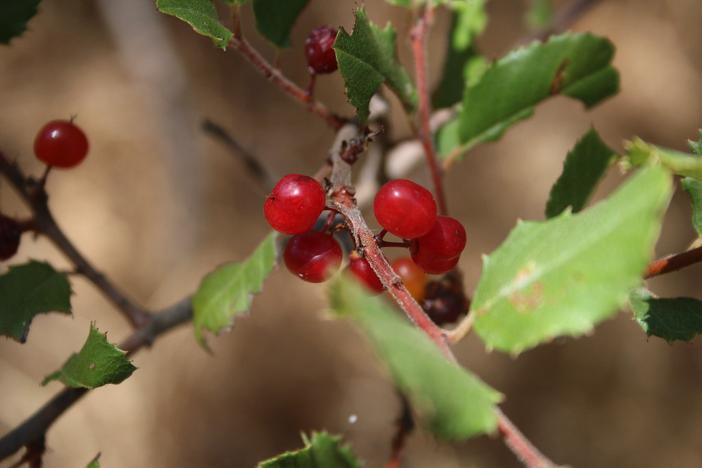Hollyleaf Redberry
(Rhamnus ilicifolia)
Hollyleaf Redberry (Rhamnus ilicifolia)
/
/

Joe Decruyenaere
CC BY-SA 2.0
Image By:
Joe Decruyenaere
Recorded By:
Copyright:
CC BY-SA 2.0
Copyright Notice:
Photo by: Joe Decruyenaere | License Type: CC BY-SA 2.0 | License URL: https://creativecommons.org/licenses/by-sa/2.0/ | Uploader: joedecruyenaere | Publisher: Flickr



































































Estimated Native Range
Summary
Rhamnus ilicifolia, commonly known as hollyleaf redberry, is an evergreen shrub native to the chaparral and woodlands of California, extending into Arizona and Baja California. It typically grows to a height of up to 13 feet (4 meters) and is characterized by its dense, thorny branches. The leaves are dark green, oval to rounded with spiny-toothed edges and a tendency to curl under, giving them a concave appearance. They measure about 0.8 to 1.6 inches (2 to 4 centimeters) in length. Hollyleaf redberry blooms from April to June, producing small, inconspicuous flowers with four pointed sepals and no petals, followed by bright red berries that are attractive to birds.
Hollyleaf redberry is valued for its drought tolerance and ability to thrive in challenging conditions, making it a suitable choice for xeriscaping and native plant gardens. It provides excellent habitat and food for wildlife, particularly birds that feed on the berries. In cultivation, it is used for erosion control, as a hedge or screen, and in restoration projects. This shrub prefers full sun to part shade and requires minimal water once established, making it low maintenance. It is adaptable to various soil types, provided they have medium drainage. Gardeners should be aware that the spiny leaves can make handling difficult, and the plant may spread if conditions are favorable.CC BY-SA 4.0
Hollyleaf redberry is valued for its drought tolerance and ability to thrive in challenging conditions, making it a suitable choice for xeriscaping and native plant gardens. It provides excellent habitat and food for wildlife, particularly birds that feed on the berries. In cultivation, it is used for erosion control, as a hedge or screen, and in restoration projects. This shrub prefers full sun to part shade and requires minimal water once established, making it low maintenance. It is adaptable to various soil types, provided they have medium drainage. Gardeners should be aware that the spiny leaves can make handling difficult, and the plant may spread if conditions are favorable.CC BY-SA 4.0
Plant Description
- Plant Type: Shrub
- Height: 10-15 feet
- Width: 7-10 feet
- Growth Rate: Moderate
- Flower Color: N/A
- Flowering Season: Spring
- Leaf Retention: Evergreen
Growth Requirements
- Sun: Full Sun, Part Shade
- Water: Low
- Drainage: Medium
Common Uses
Bee Garden, Bird Garden, Butterfly Garden, Deer Resistant, Drought Tolerant, Hummingbird Garden, Low Maintenance
Natural Habitat
Native to the chaparral and woodlands of California, Arizona, and Baja California
Other Names
Common Names:
Scientific Names: Rhamnus ilicifolia , Endotropis crocea subsp. ilicifolia , Rhamnus crocea var. ilicifolia , Rhamnus crocea subsp. ilicifolia , Ventia crocea subsp. ilicifolia
GBIF Accepted Name: Endotropis crocea subsp. ilicifolia (Kellogg) Hauenschild